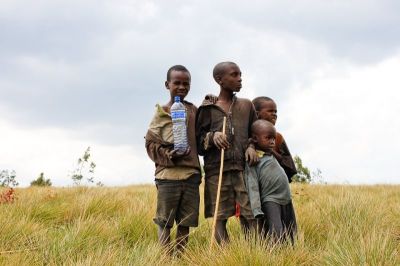COVID-19 isn’t just giving people pneumonia, it’s starving them too

By this point, most Americans are aware of the health implications of COVID-19 in developing countries. Africa has had 1.25 million confirmed cases of the virus. India, now experiencing the fastest growth rate globally, has roughly 3.7 million cases. Shortages of doctors and equipment have made contracting the virus much more dangerous in many of these places, and the increased demand on these resources is endangering many with underlying conditions, even if they don’t have the novel coronavirus.
But it’s not just the availability of healthcare that will devastate countries like Sudan and Haiti. It’s the food shortages. In fact, more people could die of hunger linked to COVID-19 than from the virus itself.
With millions of people on lockdown, their ability to work has been limited. This means many cannot afford to eat. Those who are working may be finding that their incomes have diminished significantly. According to the World Bank, global production levels for staples like rice, wheat and maize are near all-time highs, but “the prices of certain cash crops – an important source of rural income – have been depressed by the slowing of global demand.” More than 820 million people were already food insecure before the pandemic, but now the United Nations World Food Programme has estimated that 265 million people could face acute food insecurity by the end of 2020.
The global food supply chain has also been disrupted. There is food available, but it’s not getting where it needs to go. “Transportation restrictions have made it difficult for farmers to obtain seeds and fertilizer” and send harvests to local food markets, according to a TIME report. Trade between countries has slowed, and continued flooding and violence have impeded food cultivation. To make matters more complicated, the worst locust outbreak in 70 years is threatening the food supply of nearly 5 million people in Africa.
Meanwhile, other diseases like tuberculosis are spreading. It’s a little-known fact that tuberculosis kills 1.5 million people each year. In the U.S., we’re shielded from the devastation of diseases like this. But now, about four-fifths of global tuberculosis, H.I.V. and malaria programs have reported disruptions in services. People aren’t able to get the treatment they need because of closed clinics and travel restrictions. And more sick people in a family means fewer people working and less money and food for that family.
This means there must be new, innovative ways to address these gaps in health care and food based on local, community-led efforts to help those who are vulnerable and renewed international assistance to help advance global health and food assistance.
At World Relief, for example, our Agriculture for Life program allows farmers to maximize the resources they have to obtain the greatest number of quality food products. This model is based on the Farmer Field School (FFS) model where 20-25 small-scale farmers are taught sustainable techniques and other innovative practices. Agriculture for Life programs also weaves in nutrition education and gender as it relates to production and use of agriculture. This program allows farmers to maximize the resources they have to obtain the greatest number of quality food products.
Another program maximizes economic benefits for a local family. The Savings for Life programming offers reliable financial services to people who are otherwise excluded from formal banking institutions. Since 2008, we’ve reached more than 100,000 people across six countries. Through appropriately-sized loans, credit and insurance, group members can meet daily household needs and establish their own income-generating activities.
In Rwanda, in partnership with Mennonite Economic Development Associates (MEDA) and the University of Michigan, we found that these programs, when offered together, provide smallholder farmers substantially greater agricultural, nutritional and economic improvements compared to either program on its own or no program intervention at all.
We need to continue supporting programs like these through both federal and individual funding. The need is more urgent now than ever. In the U.S., we are sadly all too familiar with the effects COVID can have as over a hundred thousand people have lost their lives and our economy reels backwards. But we must not lose our commitment to fighting the disease abroad as malnutrition continues to devastate. There isn’t a cure for COVID, but there are answers for food shortages. We can do something about this.
Tim Breene is CEO of World Relief.




























